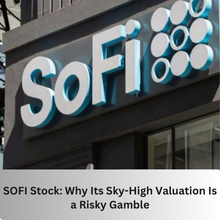
SoFi Technologies (SOFI) has caught the attention of investors and analysts alike. This company, which began as a student loan refinancing platform, has evolved into a full-fledged fintech powerhouse. With its diverse range of financial services, including lending, wealth management, and insurance, SoFi has made a name for itself in the tech-driven finance space. However, despite its impressive growth trajectory, its stock valuation has reached alarming levels, leaving investors with some serious questions. Is the stock price too high for the growth potential SoFi offers? In this article, we’ll break down why I believe SoFi’s sky-high valuation can’t be justified by its exciting growth prospects alone.
SoFi Technologies: A Quick Overview
SoFi Technologies is a California-based company offering a digital-first approach to lending and financial services. Founded in 2011, SoFi started by refinancing student loans but soon expanded into a variety of financial products such as personal loans, mortgages, credit cards, and investment services. Today, SoFi stands out as a major player in the fintech space, providing services that directly compete with traditional banks while offering a more convenient and tech-driven experience.
In the last 12 months, SoFi’s stock has outperformed the broader financial sector by a wide margin. However, the question remains: does this performance truly reflect the company’s value, or is it a product of market speculation?
Why the Excitement Around SoFi Stock?
The primary reason for the excitement surrounding SoFi stock lies in its impressive revenue growth and rising membership numbers. Over the past year, SoFi has benefited significantly from the macroeconomic environment, which has been favorable to lenders. High interest rates have allowed SoFi to increase its interest income, while the resumption of student loan payments has boosted its membership base. These factors, combined with strong market sentiment, have allowed SoFi to triple its revenue over a short period.
But there’s more to this story than just numbers. The current market environment, which has been favorable to fintech companies, has led investors to become overly optimistic about SoFi’s future. The company has benefitted from the “risk-on” mentality of investors, but what happens if market conditions change?
SoFi’s Sky-High Valuation
The most glaring issue with SoFi right now is its incredibly high valuation. The company’s price-to-earnings (P/E) ratio is vastly out of sync with the financial sector. SoFi’s non-GAAP P/E ratio (TTM) is 114.4x, which is 733% higher than the sector median of 13.7x. This is worrying for several reasons. A P/E ratio that high suggests that investors are paying a huge premium for SoFi’s expected future earnings. But the question remains: Is the company’s future growth really worth this lofty price tag?
Even more worrying is the forward P/E ratio of 134.6x, which is 890% above the sector median. SoFi’s GAAP P/E ratios tell a similar story, with a TTM P/E of 132.5x and a forward P/E of 119.5x. These numbers suggest that the market has placed extremely high expectations on the company, but such valuations come with substantial risks. If SoFi fails to meet these expectations, its stock price could face a significant correction.
Execution Risk and the High Premium
One of the key risks tied to SoFi’s sky-high valuation is execution risk. This is the risk that the company will fail to meet the ambitious growth targets priced into its stock. SoFi has high growth expectations, with earnings growth projected at around 60% annually over the next few years. While this growth rate is impressive, it also raises the stakes. SoFi must consistently outperform to justify its high stock price. Any slip-up in execution, whether due to internal issues or external market factors, could lead to a significant drop in stock value.
The Macroeconomic Environment: Friend or Foe?
SoFi’s success over the past year has been closely tied to the broader macroeconomic environment. High interest rates have provided a tailwind to lenders like SoFi, increasing their profitability. Additionally, the resumption of student loan payments has given SoFi a boost in terms of new memberships. However, this environment is not guaranteed to last.
If interest rates fall, or if the macroeconomic conditions that have supported SoFi’s growth shift, the company could face headwinds. For example, a change in government policy or a downturn in consumer confidence could hurt SoFi’s loan portfolio and limit its growth potential. This uncertainty adds another level of risk for investors.
SoFi’s Revenue Explosion: A Flash in the Pan?
SoFi’s revenue growth over the past year has been nothing short of remarkable. The company has seen its revenue triple, driven by an expanding loan book and increased membership. However, it’s important to ask whether this growth is sustainable. Much of SoFi’s recent success can be attributed to the favorable macroeconomic environment, but these factors are subject to change.
In other words, while SoFi’s explosive growth is impressive, it may not be sustainable if the external conditions that have driven this growth start to deteriorate.
The Loan Portfolio Problem
Another concern for SoFi is the quality of its loan portfolio. Recently, the company has seen a significant increase in delinquent loans, with a rise in loans that are 90 days past due. This is troubling, as it suggests that more of SoFi’s customers are facing financial difficulty. Additionally, the company has experienced a fivefold increase in loan charge-offs compared to the previous year, indicating that more borrowers are defaulting on their loans.
These signs of deterioration in SoFi’s loan portfolio raise questions about the long-term sustainability of the company’s growth. If loan defaults continue to rise, SoFi’s profitability could take a hit.
Consumer Debt Crisis: A Growing Concern
SoFi’s growth is also tied to consumer spending and borrowing habits. However, the growing consumer debt crisis in the U.S. poses a risk to the company. High levels of consumer debt make it more likely that borrowers will default on their loans. If the financial stress on consumers continues to worsen, it could have a negative impact on SoFi’s loan performance.
With consumer debt levels at record highs, SoFi may find itself in a difficult position if the economy enters a downturn or if borrowers become unable to pay off their loans.
Earnings Projections and What They Mean
SoFi’s earnings projections for the next few years are impressive, with analysts expecting earnings per share (EPS) to more than double from $0.13 in 2024 to $0.28 in 2025. This would represent a 111.7% year-over-year increase. However, these projections are based on the assumption that the company will continue its rapid growth trajectory, which is far from guaranteed.
The company’s valuation already reflects these high expectations, meaning any shortfall in earnings could lead to significant losses for investors.
SoFi’s Valuation Compared to Industry Standards
When comparing SoFi’s valuation to its competitors, the numbers are staggering. The average P/E ratio for the financial sector is much lower than SoFi’s, which suggests that the market is pricing in a level of growth that may not be achievable. While SoFi’s growth prospects are strong, the company’s valuation appears disconnected from industry standards.
Also read: Costco Eggs Recalled: Potential Salmonella Risk – Act Now
Could SoFi Be a Hidden Gem?
Despite the risks, there’s always a chance that SoFi could surprise investors. The company has demonstrated strong earnings growth and has managed to outperform analysts’ expectations in the past. If SoFi continues to execute flawlessly, it could prove that its high valuation is justified.
However, the risks associated with such a high valuation mean that the rewards may not be worth the gamble for most investors.
SoFi’s Stock Performance: Is the Growth Sustainable?
SoFi has outperformed the broader market over the past year, but the question remains: Is this growth sustainable? While the stock has been driven by sentiment and speculation, the company’s future performance will depend on its ability to meet its ambitious growth targets. If the broader market sentiment shifts, SoFi’s stock could face significant declines.
The Risks of Investing in SoFi Technologies
Investing in SoFi stock comes with substantial risks. The company’s high valuation leaves little room for error, and any underperformance could lead to a sharp decline in stock price. Additionally, the company’s loan portfolio shows signs of strain, and the broader macroeconomic environment could change, negatively affecting its growth prospects.
Analyst Ratings and Market Sentiment
On platforms like TipRanks, SoFi currently holds a “Hold” rating from analysts. The consensus is that the stock has significant downside potential, with the average target price suggesting a 34.75% decline from its current level. While there are some bullish analysts, the overall sentiment is cautious.
The Bottom Line: Is SoFi a Good Investment?
While SoFi Technologies has impressive growth potential, its current stock price is too high to justify the risks. The company’s sky-high valuation, combined with execution risks and the potential for changing macroeconomic conditions, makes it a risky investment. Investors should be cautious before jumping in, as the rewards may not outweigh the risks.
Also read: Is Trader Joe’s Open on Thanksgiving? Find Out Now
FAQs
What is the current P/E ratio of SoFi stock?
SoFi’s non-GAAP P/E ratio is 114.4x, which is far above the sector median of 13.7x.
How does SoFi’s valuation compare to its competitors?
SoFi’s valuation is significantly higher than the industry average, suggesting high expectations for future growth.
What factors are affecting SoFi’s stock price?
SoFi’s stock price is influenced by its growth potential, macroeconomic factors (interest rates, consumer debt), and market sentiment.
Is SoFi a good investment in the long term?
SoFi’s long-term prospects are uncertain due to its high valuation, execution risks, and dependency on macroeconomic conditions.
What are the biggest risks investors should consider?
Investors should be wary of SoFi’s high valuation, the quality of its loan portfolio, and potential changes in the macroeconomic environment.

